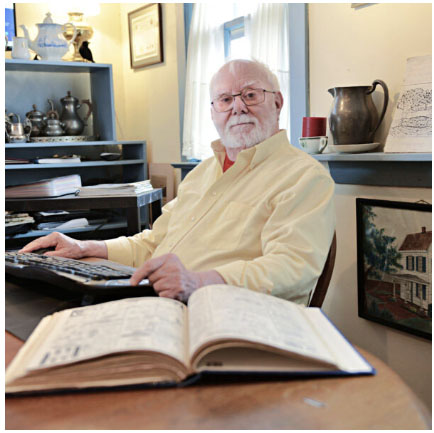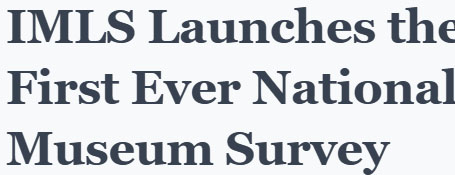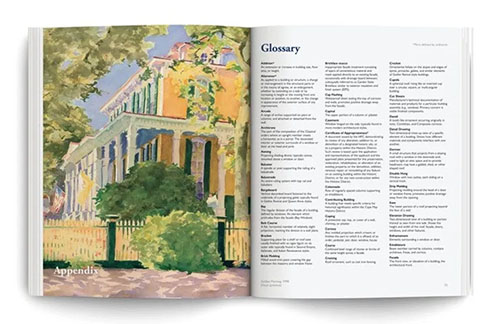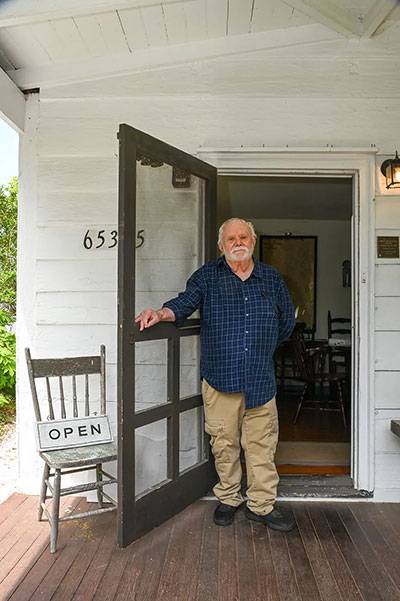653 ½ Washington Street, Cape May, NJ| 1730colonialhouse@gmail.com | Find us on Facebook
Harry Bellangy is Cape May MAC's Volunteer of the Month for April 2025. He is the historian at the Greater Cape May Historical Society, working amidst historic artifacts and paperwork collected and shared with the community for over 50 years. The society and the Colonial House Museum collaborate with Cape May MAC for Holiday, Garden, and Victorian Weekend tours. Nominated by Cape May staff, Harry, a lifelong resident, greets visitors at the Colonial House Museum from June 15 to September 15.

He offers engaging tours on Saturdays from 1:00 PM to 4:00 PM and can answer questions via email at 1730colonialhouse@gmail.com.

In January this year, the New Jersey Cultural Trust accepted the Society’s application to be designated as a qualified organization as defined under the rules of the Cultural Trust. It was officially approved by Board vote at the Cultural Trust Board meeting on January 15, 2025. The list of qualified organizations on the New Jersey Cultural Trust website has been updated to include your organization. The certification is a review of the society board and records. It is a three-year cycle. The Society has held Cultural Trust certification for a decade.
The New Jersey Cultural Trust was established by law in July 2000 to develop a permanent source of additional funding for arts, history, and humanities organizations to help them improve their offerings to the public by achieving greater financial and operational stability. The grant programs to date have been awarded $10.4 million.

In January, the Society was invited to the Institute of Museum and Library Services (IMLS) to complete the National Museum Survey (NMS).! The NMS requests high-level information about institutional characteristics, facilities, finances, human resources, admissions and visitors, and digital presence. Once data gathering is complete, the Society will have access to a dashboard of summary results and reporting tools. Responding is an opportunity to ensure our institution’s story is part of the national narrative.to grants and policymakers.

The picturesque town of Cape May, with its late Victorian architecture and charming streetscapes, has long stood as a prime example to the power of preservation. Granted landmark status almost 50 years ago, city officials understood the importance of saving and maintaining their history. During this time, the creation, implementation and ultimate updates of the official Design Standards have become an integral part of living and owning property in Cape May.
Read More Cape May Leads the Way with their Design Standards (preservationnj.org)

Meet Cape May historian Harry Bellangy, President of the Greater Cape May Historical Society. The Society is celebrating fifty years serving the Cape May community since 1974. Harry, a local and the town historian met with Cape May Magazine for an interview with Tommy Raniszewski. They met at the Colonial House one of only a few early settlement houses in the county open to the public and free to visit. It was built in 1730 to operate as a tavern. It was the home of Revolutionary War hero Memucan Hughes and currently the Greater Cape May Historical Society. To read the interview follow the link......Harry Bellangy – Cape May Magazine
Caption: Harry Bellangy at the Colonial House. Photo courtesy of Cape May Magazine

Cape May MAC’s (Museums+Arts+Culture) Volunteer of the Month for April is Cape May Historical Society President and Historian Harry Bellangy, of Cape May, shown here at the society’s headquarters, the circa 1730 Colonial House Museum, 653 ½ Washington St.
The society and museum are longtime partners to Cape May MAC. Bellangy, a lifelong Cape May resident, was nominated by Cape May MAC Chief Outreach Strategist Mary Stewart for volunteering his time to give a talk titled, “Magnesite: A World War II Necessity.” His talk was part of Cape May MAC’s Lunch & Learn educational series, a twice monthly program offered both live and online via Zoom, on enlightening and entertaining topics of history and culture.
He included in his talk the history of Cape May’s magnesite plant that operated during World War II off Sunset Boulevard. The audience was captivated, he said. “They loved it. They had no idea in many cases what magnesite was and what it did or its importance during World War II. They had no idea magnesite could be extracted from sea water,” he said.
Many in the audience were interested in the environmental impact from the plant, as well, he said, from dust which is alkaline that affected acid-loving plants nearby, such as pines. “Harry is an engaging presenter, and his knowledge of Cape May history is broad and deep,” said Stewart. “The Colonial House Museum is a Cape May gem and Harry is an invaluable asset to the Cape May community. We are so fortunate and grateful to him for sharing his expertise with us and with the public.”
The grant award establishes a cash reserve for historic preservation and collection projects. Preservation is ongoing and an essential part of our mission. Successful grant writing is critical for supporting history projects and the Memucan Hughes Colonial House. However, it frequently requires the organization to pay for the work prior to receiving reimbursement funds. With this grant award, the Society can borrow, then later replenish, the cash reserve funds which takes the pressure off the operating budget. According to the New Jersey Cultural Trust, the Financial Stabilization Grant Program helps non-profit organizations address "operational challenges that threaten their stability and to help build greater operational capacity to manage and advance their work and achieve their missions."

© 2025 Greater Cape May Historical Society. All rights reserved. | Site: Cape Publishing, Inc.